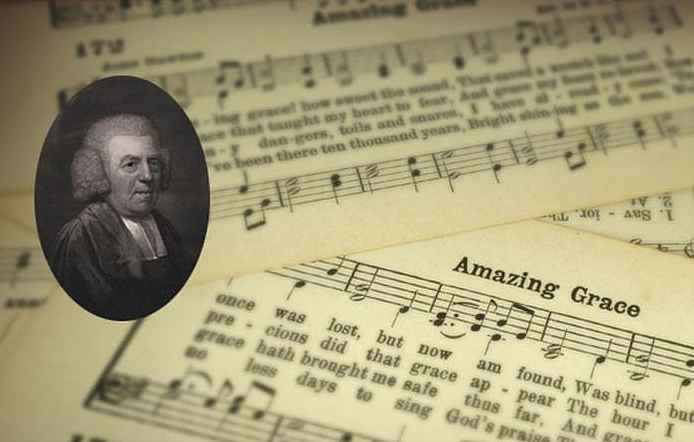






See listing of Recent and Most Popular articles on the Home Page
Connections
Category: Relationships / Topics: Beliefs • Change • Crime, Justice, Punishment • Current Events, News • History • News • Racism and Inequality • Relationships • Social Issues • Social Movements
Changing Racist Hearts (4)
by Rusty Wright
Posted: July 8, 2020
'Amazing Grace' hymnwriter's racist past…
Read the other articles in Rusty's series:
"Changing Racist Hearts: Can it be done?"
"Changing Racist Hearts (2): Police brutality: Lessons from South Africa"
"Changing Racist Hearts (3): Starting with my own"
"Changing Racist Hearts (5): Abolishing the slave trade."
(Article will open in a new window or tab. Close it to return here.)
You've likely heard the famous hymn, Amazing Grace. Were you aware of its writer's racist past? I thought I knew his real story, but I didn't. It holds valuable lessons for today's racial turmoil.
People the world over love Amazing Grace. It's been sung at countless memorial services, civil rights events and churches. Recently, people in 50 COVID-affected nations sang it together in an inspiring video.
John Newton was an eighteenth-century British slave trader who had a dramatic faith experience during a storm at sea. He left the slave trade, became a pastor, and wrote hymns. "Amazing Grace! (how sweet the sound)," Newton wrote, "That saved a wretch like me! I once was lost, but now am found, was blind but now I see." He helped abolish the slave trade.
Surprising twists
But, some surprising twists: Newton only became a slave-ship captain after coming to faith in Jesus. And he left slave trading not for spiritual reasons, but for health. Consider "the rest of the story…."
A self-described "freethinking" rationalist, Newton negotiated with African chiefs to obtain slaves and had sexual relations with female slaves. He called himself a terrible "blasphemer" who rejected God completely. But then, as Forrest Gump might say, God showed up.
A violent storm flooded his ship with water. Fearing for his life, he soon "…began to think of…Jesus whom I had so often derided…of His life and of His death…for sins not His own, but for those who in their distress should put their trust in Him."
In coming days, he became convinced Jesus' message was true. "I was no longer an atheist," he wrote. "I was sincerely touched with a sense of undeserved mercy in being brought safe through so many dangers. … I was a new man."
Blind spots
Yet Newton saw no conflict between slaving and his new beliefs. As a slave-ship captain, he held onboard Sunday worship services for his crew.
Christian worship on a slave ship? Newton was still a work in progress. Slavery was generally accepted as a pillar of British economy; few yet spoke against it. Biographer Jonathan Aitken observes that in 1751, Newton's spiritual conscience "was at least twenty years away from waking up to the realization that the Christian gospel and human slavery were irreconcilable."
A mysterious illness ended his seafaring career. He became a pastor and significantly impacted a young Member of Parliament who would help rescue an exploited people and a nation's moral conscience.
Abolishing the slave trade
William Wilberforce, a rising political star, considered leaving Parliament for the ministry. In 1785, he sought Newton's counsel. Newton advised Wilberforce to remain in Parliament and became his mentor. An arduous, twenty-year effort to abolish the slave trade ensued.
In 1788, Newton's widely circulated pamphlet, Thoughts Upon the African Slave Trade, declared: "I hope it will always be a subject of humiliating reflection to me that I was once an active instrument in a business at which my heart now shudders." Abolitionists sent copies to all MPs.
Newton testified before important parliamentary committees, describing chains, overcrowded quarters, separated families, sexual exploitation, flogging, beating, butchering. The slaver once blind to his own moral hypocrisy now could see. Biographer Aitken says "Newton's testimony was of vital importance in converting public opinion to the abolitionist cause."
Heading home
In early 1807, Britain outlawed the slave trade. Following Newton's death on December 21 of that year, his gravestone bore his self-written epitaph: "John Newton. Once an infidel and libertine, a servant of slaves in Africa was by the rich mercy of our Lord and Saviour Jesus Christ preserved, restored, pardoned and appointed to preach the faith he had long laboured to destroy. . . ."
Lessons for today's struggles? Racist laws and practices can be changed. Faith, properly applied, can help significantly. Moral maturation can take time. People have blind spots. Humility helps. We are all works in progress.
Copyright © 2020 Rusty Wright
This article first appeared on WashingtonExaminer.com
Search all articles by Rusty Wright
Rusty Wright is an author and lecturer who has spoken on six continents. He holds Bachelor of Science (psychology) and Master of Theology degrees from Duke and Oxford universities, respectively. www.RustyWright.com • E-mail the author (moc.loa@thgirwytsur*) • Author's website (personal or primary**)* For web-based email, you may need to copy and paste the address yourself.
** opens in a new tab or window. Close it to return here.
Posted: July 8, 2020 Accessed 629 times
![]() Go to the list of most recent Connections Articles
Go to the list of most recent Connections Articles
![]() Search Connections (You can expand the search to the entire site)
Search Connections (You can expand the search to the entire site)
![]() Go to the list of Most Recent and Most Popular Articles across the site (Home Page)
Go to the list of Most Recent and Most Popular Articles across the site (Home Page)
 Loading requested view...
Loading requested view...